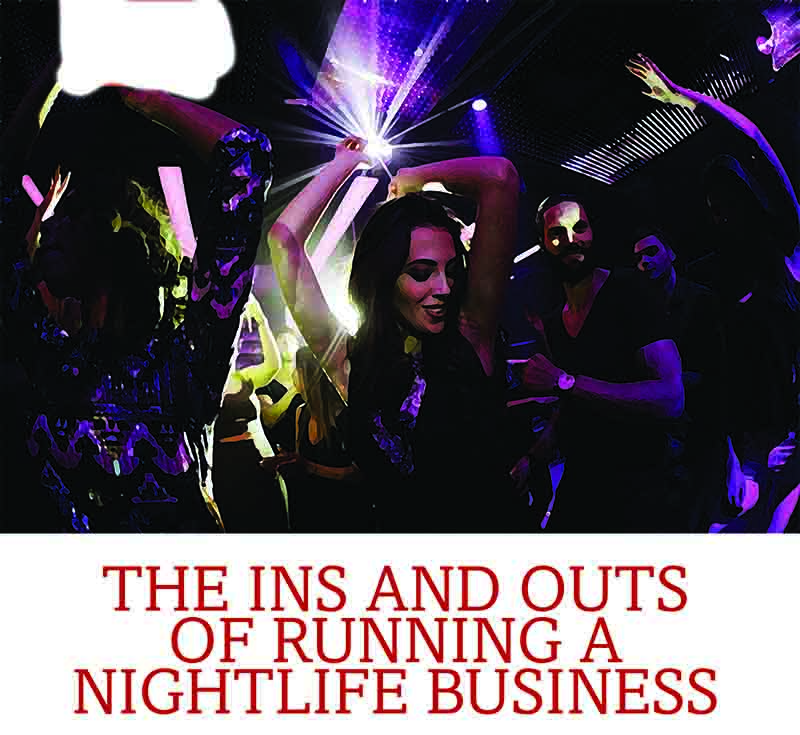

Text by Ankita Jain
The night club business in Nepal is not an easy one to master. Behind the glamour, there are permits, licenses and bureaucracy to manage. It takes tremendous amount of attention to create a brand that sizzles and if you’re lucky enough to succeed, then you have to worry about staying relevant and keeping your fingers on the pulse of what people want in the face of stiff competition.
With the mushrooming clubs, lounges and bars in the capital, B360 tries to get hold of the key elements that attribute towards drawing long lines at the door.
-

“Club Déjà Vu plans to get major renovation on its interiors. “It’s a must to pull crowds and walk hand-in-hand with the new players in the market.”
Pratik Shrestha
One of the current owners of Club Déjà Vu
Exclusivity
First and foremost, a night club, bar or lounge does not run seven days a week. To be successful you have to focus your efforts on one or two or maybe three nights in a week. “Focus on as few nights as possible and put as much effort as you can into these. The more nights you focus, the less exclusive it is, the fewer reason people will want to go,” says Rabin Shrestha, Co-founder of Lord of the Drinks.
Friday night is considered the most important day of the week for business in the nightlife industry. From operational costs to profits, everything multiplies on this day. According to sources, the three months old LOD is doing maximum business amongst all night clubs in the capital with business on Friday at Rs 15 lakhs against operational cost of Rs 4-5 lakhs. “LOD has the capacity to accommodate 2500 people and we witness a footfall of more than 1600 on Friday nights alone,” Rabin states.
Another club that is currently creating a sensation is Privé Nepal. The club sells on exclusivity and is the only club in the country which opens twice or thrice a week. “Functioning of a club or lounge also depends on the location. In a place like Thamel or Durbar Marg, there is no hassle running seven days a week,” says Kumar Gurung, Founder, Owner and CEO of King’s Group.
Club Déjà Vu used to be the go to place a few months back and with two new brands in the business is currently pulling its sock to gain back momentum. “We were doing good business before an internal conflict. Now we are working on the loopholes and trying to reach those figures back. Currently we do a business of Rs 6-7 lakhs on a Friday night,” shares Pratik Shrestha, one of the current owners of Club Déjà Vu.
The other players in the capital’s nightlife business that are considered “it’ places are Purple Haze and King’s Lounge. “Our Friday night sale is around Rs 8-10 lakhs with a footfall of 500-800. Since we focus on creating a family type environment, people step in to our lounge for dining and wining as well,” shares Kumar.

Rabin Shrestha
Co-founder of Lord of the Drinks
Liquid Factor
The nightlife industry thrives on the liquor business. With seven successful years in the business, Purple Haze is known to sell the maximum number of beers in the capital. It is the only bar which makes substantial money from annual contracts with different beer manufacturing brands in the country. “Since we sell a huge quantity, we are more like a beer outlet. And this status - we have earned it! We came up with our first contract three years back and it caused ripples in the industry,” recalls Ashok Sen, Owner of the Purple Haze Rock Bar. Today Purple Haze has an annual contract with four beer manufacturing companies: Everest, Tuborg, Arna and Sherpa. The companies know that if you want your beer to have a strong identification with the youth, it must be served at the Purple Haze. A key reason behind the massive sale of beer in Purple Haze is its pricing. “A bottle of beer here costs Rs 600 and this is the reason why people love us. We are known as the people’s bar,” Ashok elaborates.
On the other hand, LOD, Club Déjà Vu and King’s Lounge are not bound by any contract. “We don’t want to force our customers with a particular brand. We want every brand to be available for our customer to choose from,” informs Rabin.
The major profit a nightclub earns is from liquor sales. “The markup in liquor is so high that any club/lounge can easily make quick money. Well, it is one of the major reasons why more and more players are entering into this business,” Rabin briefs. Keeping in mind the high liquor prices, the minimum spending capacity of a person in LOD is Rs 3000 on average. Similarly, Club Déjà Vu and King’s Lounge witness Rs 2000 average sales per person especially on a Friday night. Purple Haze, on the other hand, ensures every person buys at least a bottle of beer.
Investment
While older players like Purple Haze Rock Bar invested Rs 10 million as initial capital, the newer ones in town like LOD had an investment of Rs 150 million approximately. They all agree that the return on investment is not that tough in this business, rather staying on the top for long is. “If everything goes well, the investment will be recovered within a year,” says Pratik. Agreeing with him, Ashok adds, “Nightclub business is quick money since the margins on beverages are high. Over the decade, I have witnessed people invest in this business, earn within 2-3 years and pack up. Looking at the current scenario, I believe that supply exceeds demand.” With an investment of Rs 80 million, King’s Lounge has already recovered half of its investment within a year. And the Group has recently opened King’s Lounge Pokhara intending to woo international tourists. Further, Purple Haze Rock Bar was the talk of the town when it opened its doors and recovered its investment in less than a year. “Nepali rock music was dying and we offered the stage for them. This way we pulled not only the domestic crowd but also tourists,” explains Ashok who reinvests every year to keep the rock bar updated. To sync with the new clubs in the town, Club Déjà Vu plans to get major renovation on its interiors. “It’s a must to pull crowds and walk hand-in-hand with the new players in the market,” highlights Pratik.
The other substantial investment in this business is seen in the sound system to set the stage for the world’s best artists. “We have installed DNB audio, the system used by international bands like Coldplay. The audio system cost us more than Rs 40 million. Other than that we have invested on hydraulic lights inside the club and the ambience,” shares Rabin.
-

“By knowing your concept and staying true to it, you can create a long-lasting business regardless of what the competition is doing.”
Kumar Gurung
Owner and CEO of King’s Group
Entertainment
International artistes are highly sought after in this industry, so it’s worth investing in agrees Ashok. But do they always spell profitability is the big question. “Last year we invited Chris Adler from the renowned band Lamb of God and we paid from our pockets. Usually, international artists are not profitable since they come at a huge price tag. We host them for the love of music and pride. On the other hand, local artists are hugely profitable as they are covered by sponsors entirely and we can keep the door charges for ourselves,” informs Ashok who used to play for a bar named Neon in the same place where Purple Haze exists today.
LOD has hosted a couple of international and local artists in a short span of time. “LOD is merged with two concepts in a venue which people aren’t aware of. From 8-11: 30 pm its commercial rock music and post 11:30 pm it’s club night. There are many people who think LOD is only a club hence they turn up only after 11 pm. We are trying to change this and convey that we have early hour music too,” reveals Rabin.
Getting sponsors is not easy. They prioritise where the most footfall is, says Pratik. Talking further about the importance of a good DJ, he adds, “A good DJ can be very costly. Having the cash flow to be able to lock up a great artist when he’s available is becoming more relevant.”
Concept
Night clubs come in a range of styles, from subdued lounge to high-energy club and everything in between. Currently, the big floor concept is in agree all. “Magnificence in size and quality are the two things selling right now,” says Ashok. “The bigger the stage, the larger the profit-share,” claims Pratik. At LOD Rabin makes sure to provide an interesting visual element around every corner while taking care of emergency exits as well. “We have two exits and different entry doors. Besides we have placed fire extinguishers everywhere. Also, we have built our building in such a way that even an earthquake of 7-8 on the Richter Scale won’t do crucial damage.
“By knowing your concept and staying true to it, you can create a long-lasting business regardless of what the competition is doing,” Kumar says. “With that being said, you still need to pay a lot of attention to the integrity of the concept and make sure you are constantly refreshing and maintaining it to keep it relevant,” he adds.

Ashok Sen
Owner of the Purple Haze Rock Bar
Marketing
Pioneer in popularising the concept of professional pictures of people visiting the rock bar by uploading it on their official social media handles, Purple Haze has got as stronghold on marketing. “This strategy has contributed to 100k likes on our Facebook page. Almost 20-30% of people used to visit our bar to get their picture taken and be seen. We make sure the pictures are clicked with the permission of the customer and we respect the privacy of every guest visiting,” Ashok highlights. Club Déjà Vu and King’s Lounge also thrive on social media marketing whereas LOD gained its popularity from word of mouth recommendations.
Business hours
It’s all in the name; if you registered as a club or lounge, you can legally run your business till 2 am. Else midnight is closing hour. “Located in a place like Thamel we should be allowed to run as long as the customer wants. People start coming after 10 pm and we have to close down by 12,” reveals Ashok. To expand business hours he is trying to rebuild the concept of dine and wine in the rock bar. King’s Lounge starts business early from 8 pm and runs till 12 midnight.



-1765706286.jpg)
-1765699753.jpg)

